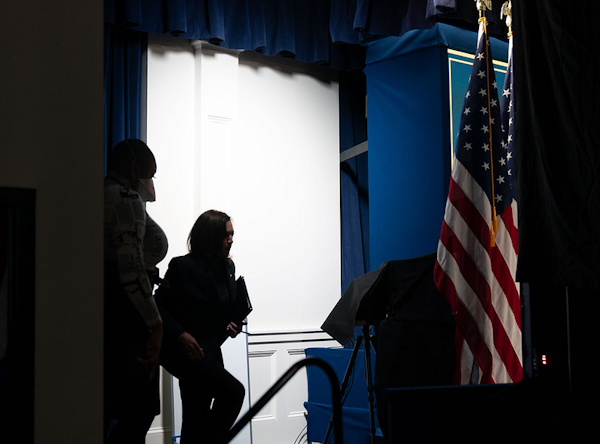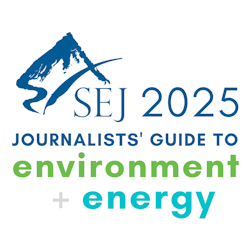SEJournal Online is the digital news magazine of the Society of Environmental Journalists. Learn more about SEJournal Online, including submission, subscription and advertising information.
 |
 |
| Vice President Kamala Harris at an event in Washington in 2021. Photo: Official White House Photo by Lawrence Jackson via Flickr Creative Commons (United States government work). |
WatchDog Opinion: Harris Must Shed More Light on Her Press Freedom Views
By Joseph A. Davis
With the election nearing and the world wracked by climate disasters and wars, it’s easy to overlook press freedom as an issue. That would be a mistake.
For starters, it would be hard to be worse on the topic than GOP presidential candidate Donald Trump, who calls the press the “enemy of the people,” while his acolytes promise to prosecute journalists (we warned you in a recent WatchDog).
Let’s face it: When it comes to
press freedom questions, Harris
has been vague, tepid or silent.
Because of that, many journalists, advocates and Democrats have been cutting Democratic presidential candidate Kamala Harris some slack on the topic. But let’s face it: When it comes to press freedom questions, Democratic presidential candidate Kamala Harris has been vague, tepid or silent.
Journalists should hold her to a higher standard. That shouldn’t be very controversial, except it is: In the silence and amid a swirl of disinformation, MAGA Republicans are dishonestly trying to use the press freedom issue against the Harris campaign.
For GOP, the issue is … ‘censorship’
 |
Case in point: At the September vice presidential debate, when CBS moderators asked about a Jan. 6-style threat to democracy, Harris’ running mate Gov. Tim Walz called out the Capitol insurrection. But GOPer JD Vance largely sidestepped the issue and argued the real threat to democracy was “censorship” — including “big technology companies silencing their fellow citizens.”
To Vance and Republicans, censorship seems to mean online social media platforms moderating what people post, in order to remove disinformation, racism, threats, trolling, etc. Or maybe kicking Trump off the platform formerly known as Twitter.
Vance’s tack is not necessarily new. Right-wingers learned years ago to use the First Amendment in seemingly contradictory ways against their opponents. Even against freedom of information proponents, like journalists and scientists.
Some readers may remember the manufactured “secret science” campaign to stop U.S. Environmental Protection Agency regulations by, in essence, forbidding rulemakings on the basis of science for which not all the underlying data was publicly available. That campaign was thrown out by a judge in 2021.
Questions we’d like Harris to answer
But Harris herself has been mostly generic about press freedom so far. She has worsened her position by limiting press interviews; during the rushed first weeks of her sudden-start campaign, some journalism groups criticized her for not granting enough access for press interviews.
Now, she’s giving more, although some journalists think it’s still too little (see Jon Allsop’s September Columbia Journalism Review article: ”Yes, Kamala Harris is talking to the press more. Is it enough?”)
In his interview at the NABJ,
Trump was accessible but
hostile and untruthful.
You could learn a lot by looking at both Harris’ and Trump’s interviews with panels from the National Association of Black Journalists. Trump was accessible but hostile and untruthful. Harris answered questions — but interviewers asked none about press freedom.
It’s glaringly obvious: News media — and the U.S. public — have a right to know more about the Democratic hopeful’s positions on press freedom.
So here are ten questions we would ask Harris, given the chance:
- Do you still support the “Journalist Protection Act (H.R. 3121 - S. 1412),” which makes it a federal crime to assault or threaten journalists?
- Do you support the PRESS Act (H.R. 4250 - S. 2074), which would establish a federal “shield” law, protecting journalists from being compelled to reveal confidential sources? Most states have them.
- Will you continue the current Department of Justice rule extending these protections voluntarily?
- Would you issue an executive order making agencies review and revise their rules for carrying out the Freedom of Information Act? Under Trump, agencies like the Interior Department and the EPA used FOIA rules politically to filter FOIA requests. The Biden administration did not undo this.
- Will you appoint an open information advocate to head the DOJ’s Office of Information Policy, which oversees the FOIA?
- Will you reset the standard for press relations at the White House and the agencies?
- Will you maintain daily White House briefings?
- Will you partake in regular presidential press conferences?
- Will you ensure civility, professionalism and prompt responsiveness from agency press offices?
- Will you commit to full transparency about Office of Management and Budget meetings and correspondence with regulated agencies? Executive Order 12866, as amended, requires this.
The WatchDog published a much longer list of press freedom needs at the start of the Biden administration. Many are not yet done.
"Trump set a low bar when it comes to press freedom,” said Seth Stern, director of advocacy for Freedom of the Press Foundation. “Biden cleared that bar but not by nearly enough. If Harris wins, she won’t enjoy the benefit of being compared to a blatantly anti-press predecessor like Biden was. She’ll need to stake out her own legacy on press freedom. She can start by vocally supporting the PRESS Act to protect journalist-source confidentiality.”
Sure there’s a fog of war. But as clouds of tear gas and threats to prosecute journalists make journalism harder and riskier, reporters themselves need to speak out. It’s surprising that we haven’t heard from more journalism groups about this.
[Full Disclosure: SEJournal Editor Adam Glenn is also deputy editor at Freedom of the Press Foundation.]
[Editor’s Note: For more on the press freedom topic, see recent WatchDog Opinion columns, “What Would a Second Trump Reign Mean for Press Freedom?” and “Will Journalism Be a Crime in a Second Trump Administration?”]
Joseph A. Davis is a freelance writer/editor in Washington, D.C. who has been writing about the environment since 1976. He writes SEJournal Online's TipSheet, Reporter's Toolbox and Issue Backgrounder, and curates SEJ's weekday news headlines service EJToday and @EJTodayNews. Davis also directs SEJ's Freedom of Information Project and writes the WatchDog opinion column.
* From the weekly news magazine SEJournal Online, Vol. 9, No. 37. Content from each new issue of SEJournal Online is available to the public via the SEJournal Online main page. Subscribe to the e-newsletter here. And see past issues of the SEJournal archived here.













 Advertisement
Advertisement 



